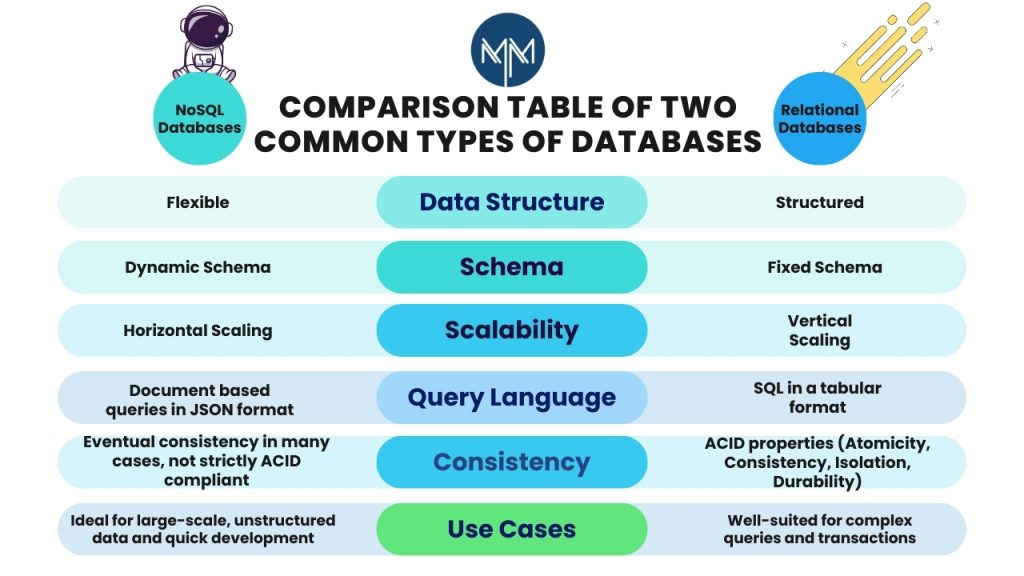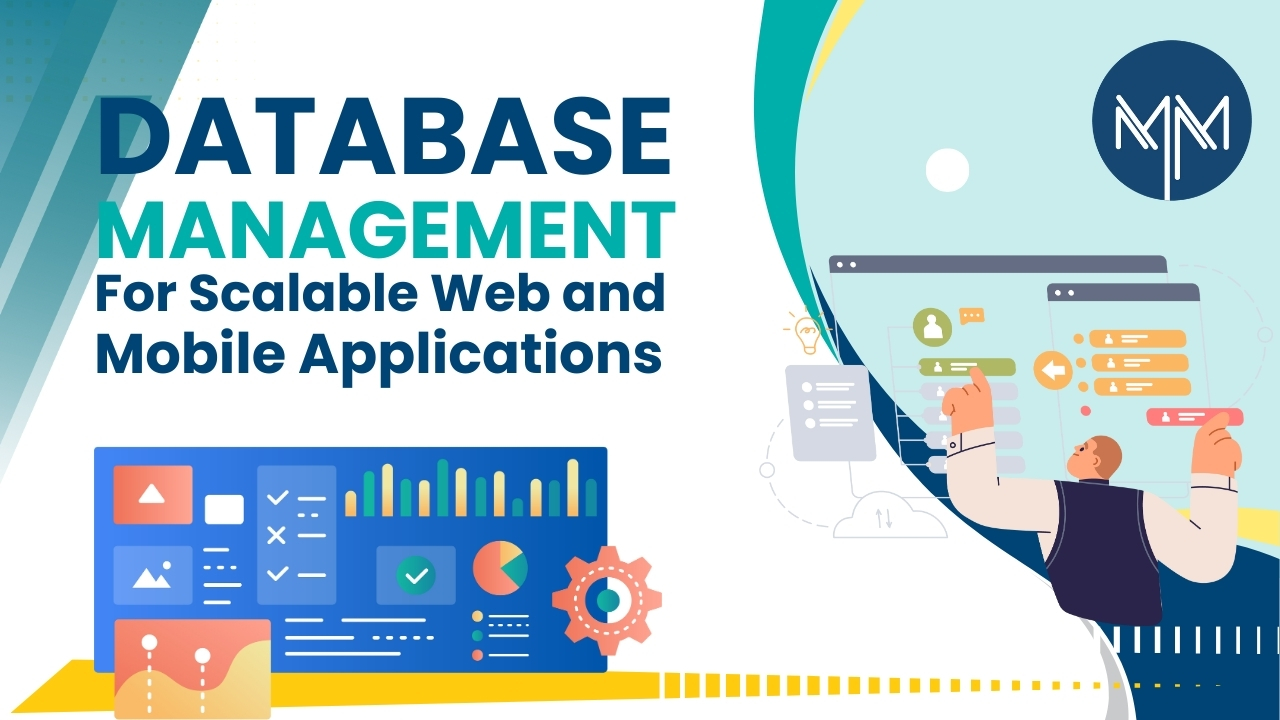At present, businesses of all margins heavily rely on their web and mobile applications to attract customers and increase overall revenue. However, your application can fail to attract clients if it does not perform well as expected. Even with the finest UI design and high code quality, several performance issues can happen if you haven’t used the correct database while building your application.
Ever wonder why certain online and mobile apps operate flawlessly with millions of users while others break when a few thousand individuals try to use them? The key is efficient management of databases, which is essential for attaining scalability in the modern digital world.
According to recent surveys, a startling 80% of mobile application consumers uninstall an app after only one use if they experience performance problems. This demonstrates how important a scalable and well-organized database is to keeping people engaged and making sure an application succeeds.
Significance of database management:
Imagine a busy online retailer with thousands of customers attempting to make purchases at once during a flash sale. This scenario might become a nightmare with delayed loading times, unsuccessful transactions, and irate consumers if there wasn’t a strong database management system in place.
Consider a rival business that offers a flawless customer experience. What is their secret? It all comes down to the way they handle their databases.
The foundation of contemporary technology is managing databases, which makes sure that enormous volumes of data are stored, retrieved, and organized with ease. It provides effective data processing and retrieval and supports the operation of mobile platforms, websites, and applications.
Effective database management is essential to corporate operations as it improves performance, allows for scalability, and aids in well-informed decision-making. A well-maintained database guarantees dependability, data integrity, and security in an era where data is critical, stimulating innovation and propelling technological breakthroughs. The capacity of database administration to convert unprocessed data into useful insights ultimately determines the success of both applications and enterprises.
In the current landscape, where digital transformation is accelerating at an unprecedented pace, the demand for scalable applications is higher than ever. From the rise of cloud computing to the adoption of microservices architecture, staying abreast of current trends is essential for implementing a database strategy that stands the test of time.
Now, let’s explore key strategies for effective database management in scalable web and mobile applications:
- Select the Appropriate Type of Database: Choose a database type first that satisfies the needs of your application. Knowing your data model is essential, regardless of whether you’re using a NoSQL database for unstructured data or a relational database for structured data.
- Enhance the Performance of Queries: Optimize the performance of your queries by refining them. Using techniques like caching, indexing, and query optimization may help make sure that your database operates quickly even when there are a lot of requests.
- Put Horizontal Scaling into Practice: Take advantage of horizontal scaling by spreading your data over several servers. This improves speed and offers a scalable solution to handle an increasing number of users.
- Keep an eye on and adjust: It is essential to continuously check the performance of your database. Make educated decisions for continuous improvements by using monitoring tools to measure query efficiency, locate bottlenecks, and identify problems.
- Disaster recovery and backup: Invest in solid backup and disaster recovery procedures to protect your data. Unexpected things may happen in the digital world, so having a solid backup plan makes sure your data is safe.
How to select the perfect database?
Selecting the perfect database involves understanding your project’s needs and considering factors like data structure, scalability, and performance. Begin by defining your data model—opt for a relational database for structured data or NoSQL for flexibility. Evaluate scalability requirements, considering anticipated user growth.
Assess performance by examining query needs and transaction volumes. Consider deployment options, such as cloud-based or on-premise solutions. Security, ease of maintenance, and community support are crucial factors. Ultimately, the perfect database aligns with your specific use case, striking a balance between functionality, scalability, and ease of management for optimal performance and long-term success.
Comparison table of two common types of databases:
| Feature | NoSQL Databases | Relational Databases |
| Data Structure | Flexible | Structured |
| Schema | Dynamic Schema | Fixed Schema |
| Scalability | Horizontal Scaling | Vertical Scaling |
| Query Language | Query language varies based on the type (e.g., MongoDB uses BSON queries) | SQL in a tabular format |
| Consistency | Eventual consistency in many cases, not strictly ACID compliant. | ACID properties (Atomicity, Consistency, Isolation, Durability) |
| Use Cases | Ideal for large-scale, unstructured data and quick development. | Well-suited for complex queries and transactions. |
| Examples | MongoDB, Cassandra | MySQL, PostgreSQL |

The top 10 database choices for web apps:
Selecting the right database for a web application is crucial for its performance, scalability, and overall success. Here are ten top database options, each with distinct strengths:
- MySQL: A reliable relational database that is open-source and ACID compatible, appropriate for applications involving transactions.
- PostgreSQL: A sophisticated relational database that is open-source, which is also extensible, supporting intricate indexing and queries.
- MongoDB: Top NoSQL database for data that is flexible and lacks schema. Perfect for applications with uncertain or changing data structures.
- SQLite: An integrated relational database that is lightweight. Ideal for applications that need little setup in small to medium-sized sizes.
- SQL Server for Microsoft: Relational database at the enterprise level. It allows for seamless Microsoft technology integration and big dataset support.
- Firebase Realtime Database: NoSQL database hosted in the cloud by Google. It’s perfect for responsive web apps because of its real-time changes.
- CouchDB: NoSQL database focused on documents. It facilitates offline functioning and permits simple replication.
- Oracle Database: A robust relational database is suitable for corporate use. It is extensively employed in important, large-scale applications.
- DynamoDB: NoSQL database that is managed by Amazon Web Services. It provides low latency performance and smooth scalability.
- Cassandra: Scalable distributed NoSQL database architecture. Ideal for managing massive volumes of data across several systems.
Conclusion
In conclusion, the success of online and mobile applications hinges on the effectiveness of database management. Regardless of the complexity of your business, the creation of a high-quality and reliable web or mobile application is contingent upon efficient database management. Mastery of the aforementioned strategies is paramount, promising not only user satisfaction but also exceeding expectations, ensuring sustainability, and fostering long-term success for your application.
The plethora of information on selecting the optimal database for your website may seem overwhelming. Acknowledging this, Matrix Media Solutions stands ready to be your trusted technology partner. With expertise in navigating and leveraging the best database options for web applications, we offer assistance to ensure your business scales seamlessly. Let us guide you through the intricacies of database management, empowering your application for optimal performance and sustained growth.


 July 23, 2019
July 23, 2019

